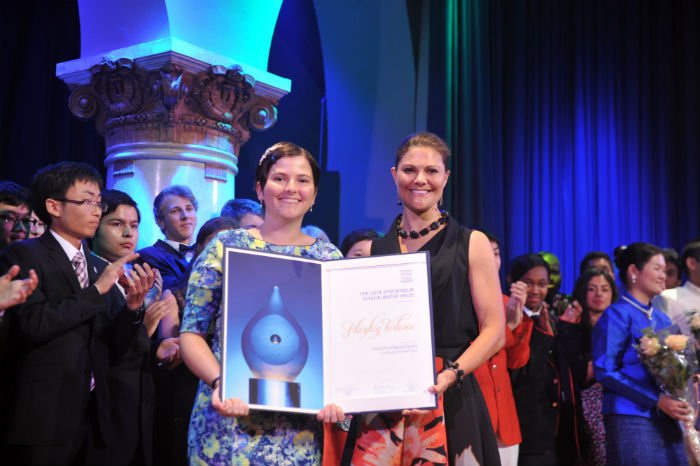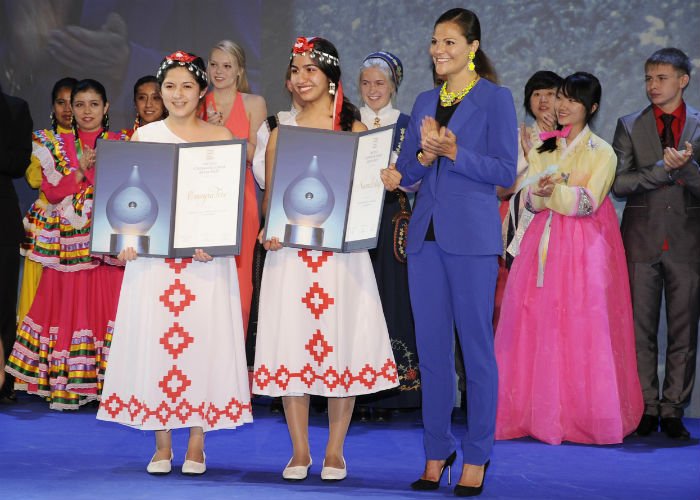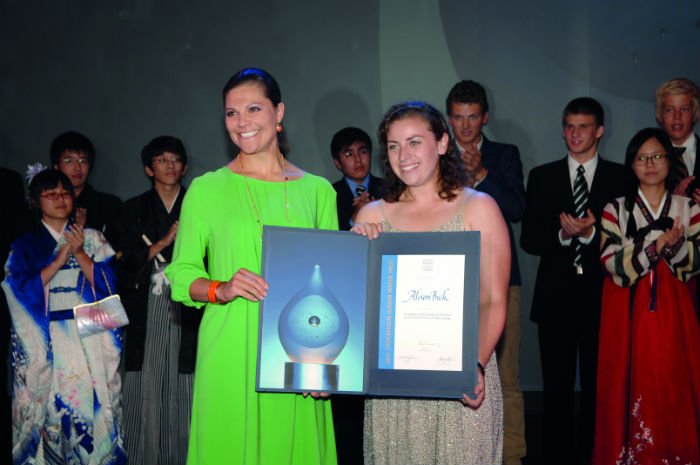This article was contributed in support of SIWI, in light of World Water Week and Young Professional's Day.
Water is needed for just about everything. The global population is growing, economies are growing – but the amount of water we have, is finite. One of the most important questions of our time is how to use and share water so that no one goes without, and none is wasted. It impacts poverty, hunger, health, energy and of course, the environment.
For the past 20 years, thousands of teenagers from around the world have competed in the Stockholm Junior Water Prize – a competition for bright young innovators who have come up with a project to help solve a water challenge.
Finalists from some 30 countries travel to Stockholm, during World Water Week, to compete in the international final. Here are some favourite future #waterheroes from previous years.
1. Claire Reid, SJWP winner 2003
Won at age 17. Country: South Africa
Project: Water Wise Reel Gardening – seed planting system
In 2003, Claire won the prize for the “Water Wise Reel Gardening” system that helped small scale farmers to be more efficient in their use of water in growing crops. Ten years on, she has developed Reel Gardening (@ReelGardening) into a successful, nation-wide business.
2. Perry Alagappan, SJWP winner 2015
All of this #WWWeek fantastic prize winners: @ch2m#SIWA2015 & Perry Alagappan #SJWP2015 & @watermanofindia#SWP2015pic.twitter.com/DoIEgB8b4j
— SIWI (@siwi_water) August 27, 2015
Won at the age 18. Country: USA
Project: Filter that removes toxic heavy metals from water contaminated from electronic waste
Perry Alagappan invented a filter through which toxic heavy metals from electronic waste could be removed from water. This first-of-its-kind filter removes over 99% of heavy metal contaminants from drinking and industrial wastewater.
Perry became interested in water purification after visiting his grandparents in India, seeing first-hand how electronic waste severely contaminated the environment. Three years after he returned home, after intensive research and experimentation (Perry is interested in water and nanotechnology), Perry won the Stockholm Junior Water Prize for his invention.
Instead of patenting his discovery, Perry wants to launch his study as an open source technology that others can use and build upon in their research. Now that’s a #waterhero.
3. Hayley Todesco, SJWP winner 2014

Won at the age of 18. Country: Canada
Project: Sand filters to treat oil contaminated water
Hayley Todesco received the Prize for inventing a method that uses sand filters to treat oil contaminated water and recover water for reuse.
Her project was a new application of an old water treatment technology that dates back to 1804. Sand filters had traditionally been used to treat drinking water, but Hayley used them on contaminated water in oil sands tailing ponds instead. The method proved to treat wastewater at a faster rate than typical processes, because the sand filters grow bacteria that effectively breaks down toxic waste.
Born and raised in Alberta, Hayley was very aware of the problem with polluted water. For a science fair project she started thinking of a way to solve the problem, when she thought back to when a guest speaker helped the students in her Grade 5 class to make water filters from pop bottles and sand. The demonstration became her eureka-moment. Just after she won the Stockholm Junior Water Prize, she also won her age category at the Google Science Fair.
4-5. Naomi Estay and Omayra Toro, SJWP winners 2013

Won at the age of 17 and 18. Country: Chile
Project: Bacteria that can clean up oil spill
Naomi Estay and Omayra Toro from Chile received the Prize for their work investigating how living organisms can help clean oil spills in extremely low temperatures. The Chilean team travelled to Antarctica and managed to identify a whole dozen of bacterial strains with the potential to clean up oil spills, by metabolizing it, in extremely low temperatures.
Felicito a Omayra Toro y Naomi Estay, jóvenes chilenas de 17 años que ganaron el Stockholm Junior Water Prize. ¡Son un orgullo para Chile!
— Sebastian Piñera (@sebastianpinera) September 24, 2013
Toro and Estay had been involved in their project for two years, which they began when participating in a school fair to Antarctica. They were interested in Antarctica because they had read about its problems with pollution from hydrocarbons. They had also read about a scientist at the University of Chile, José Manuel Pérez, who was collecting and studying bacteria from Antarctica. Their biology teacher helped them get in touch with Pérez and were able to use his laboratory to examine more than one hundred different types of bacteria.
6. Alison Bick, SJWP winner 2011

Won at the age of 17. Country: USA
Project: Water quality testing app
Alison Bick, a teenager from New Jersey, worked for four years on her project – an app that evaluates water quality. The app analyzes the picture and determine the water’s organic or inorganic qualities – that is, whether it is contaminated or not.
Her innovative method not only accurately assesses the bacteria content of water, it is both significantly faster and up to 200 times less expensive than standard testing procedures.
She got the idea after a storm hit her hometown of Short Hills, and it was announced that the water being pumped into her home could potentially be contaminated.
Now at Princeton University, Alison has patented the water safety app.
To learn more about the projects being developed by this year’s Stockholm Junior Water Prize finalists, follow the action:
Find out more about SIWI and the World Water Week by following their Twitter @siwi_water and Instagram www.instagram.com/siwi_water.
Snapchat WorldWaterWeek

You can also participate! During the Young Professionals Day, on August 30th, World Water Week opens its doors - free of charge - to enthusiasts between 16 and 35 years of age. For more information on the sessions visit the online programme and search for Young Professionals!
Not in Stockholm? You can also watch some of the events via livestream an on-demand, and follow on social media for updates.
Register:http://www.worldwaterweek.org/programme/#Young-Professionals-Day
Watch on-demand:www.worldwaterweek.org/pressroom/livestream